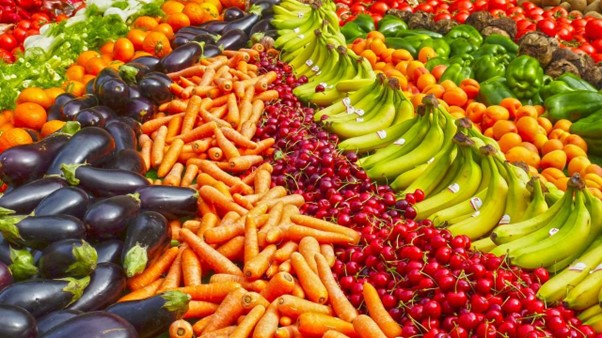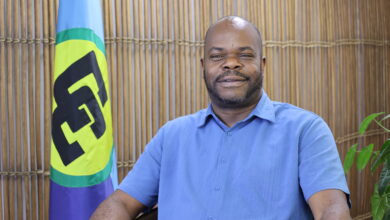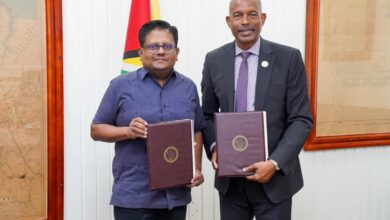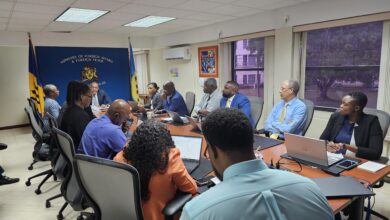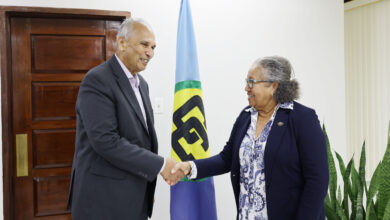Raymond is passionate about farming. He is not one to simply plant a seed and expect it to grow, but he gets literally to the root of the science behind its growth.
I met the young farmer and his family at the Arthur Chung Conference Centre in Georgetown, Guyana, during the CARICOM Agri Investment Forum and Exposition that Guyana and the CARICOM Secretariat organised. I’d stopped at his booth on the opening day of the event, Thursday 19 May, as I was interested in the broccoli that he was displaying.
We got into a lengthy discussion after I asked about the source of his broccoli. It was a lesson for me and my colleague and an insight into the passion, the conscientiousness, the challenges, the disappointments, and the vision that young people have for the development of the agriculture sector in the Caribbean. We heard about PH balance of various soils and suitability for various crops. We learned surprising details of the shelf life of some foods; how to assess the maturity of fruits and vegetables, and the nutritional and medicinal values of some produce. We heard of market accessibility or lack thereof; the need for affordable, industrial storage facilities; the importance of continuous education and the need to change the content and mode of delivery; modernising farming and the use of cutting-edge technology; networking and knowledge-sharing; and government support. He suggested we sample his sweet corn: the cobs were a variety of hues ranging from ivory to rich cream. He was confident we’d never tasted any as sweet. We hadn’t! He promised that his broccoli wouldn’t yellow in two days. It didn’t!
It’s the kind of conversation that policymakers and investors are interested in having as they zero in on exactly what is needed to stimulate the agriculture sector in the Region in the face of sky-rocketing prices for food and other commodities including fertilisers; and in response to evidence of rising food insecurity, unhealthy diets, rising levels of non-communicable diseases and the need to shape a climate resilient sector.
Agriculture Financing
The three-day Investment Forum and Expo under the theme ‘Investing in Vision 25 by 2025’, reflected the Region’s goal to reduce its US$6B food import bill by 25 per cent by 2025. Caribbean Development Bank (CDB) President, Dr. Gene Leon, recently said that according to World Bank estimates, between 80-90 per cent of all food consumed in the region comes from abroad, and only three Caribbean countries- Guyana, Belize and Haiti – produce more than 50 per cent of their own food.
The World Bank estimates between 80-90% of all food consumed in the region comes from abroad, and only three Caribbean countries (Guyana, Belize and Haiti) produce more than 50% of their own food. – Dr Gene Leon#CDBBOG52 pic.twitter.com/Iqc4weYE8C
— CDB (@Caribank) June 15, 2022

The 25 by 2025 is a quest to which the Community committed in 2020 as the COVID-19 pandemic had begun wreaking havoc across the world, and as steps were being taken in the Region to ensure that the health crisis did not become a food crisis. It wasn’t the first time that there was a recommendation for a 25 per cent reduction in the Region’s food import bill. Back in 2018, as she delivered the opening address at the Caribbean Week of Agriculture, Prime Minister of Barbados, the Hon. Mia Mottley, called for the Ministries of Agriculture, Finance, Trade and Transport of the Community to “at least work ourselves down to a reduction of 25 per cent of our food import bill in the next five years within CARICOM.”
The Forum served to pitch the regional voice to a captive audience of farmers, youth, agri-preneurs, Heads of Government and other policymakers, international and regional financial institutions, international and regional organisations devoted to developing agriculture. Its main objectives were identifying opportunities for partnership between governments and the private sector and seeking the investments that were necessary to further develop the sector. As CARICOM Secretary-General, Dr. Carla Barnett pointed out at the opening of the Forum, private investment is crucial for sustained growth of production and productivity in agriculture, as in any sector. During the event, Guyana’s Vice President, Dr. Bharrat Jagdeo pegged that figure at US$7.5B if the Region’s goal of increasing output by US$1.5B by 2025 is to be realised.
Financiers are taking up the challenge. Even before the Forum was held, President of Guyana, His Excellency Dr. Mohamed Irfaan Ali, lead Head of Government for agriculture in the CARICOM Quasi Cabinet, signalled that there was an offer of up to $20B (US$100 million) in financing for the development of the agriculture sector through a CARICOM Sustainability Agriculture Credit Facility with Republic Financial Holdings Limited as the lender. The special facility designed for agricultural activities including, but not limited to, development of priority crops, capital equipment for farming, feeder roads to provide access to arable lands, bulk storage for crops, processing plants, shade house farming. This provides funding for up to five years for repaying up to G$2B to Guyana and US$100M to all CARICOM Member States, with interest rates as low as 2.5%. At the launch of the Investment Forum and Expo back in April, Marketing and Communications Manager, Republic Bank Guyana, Ms. Michelle Johnson, reaffirmed the bank’s commitment to supporting agriculture in the Region.
In the area of de-risking the agriculture sector, a proposal from the GraceKennedy Insurance Company Limited Jamaica to the Region has started the first stage of implementation.
Two short weeks after the Forum and Expo, an indigenous bank in Guyana – Demerara Bank – launched a hassle-free Farmers Credit Line to help achieve food security in Guyana by reducing the challenges farmers face in accessing funds to develop, initially, the rice sector. The move followed a determination by the Bank that farmers were not getting credit from the institution and if they did access credit, the interest rates were very high. Demerara Bank also found that financial institutions are seeking collateral that the farmers do not necessarily have.
Food security thrust
While the Investment Forum and Expo event was the highpoint of the Region’s agriculture calendar so far for 2022, it followed conversations and actions that demonstrated the Community’s determination to move resolutely on agriculture. For example, the Region developed a CARICOM Covid-19 Response Agri-Food Plan in 2020 with the 25 in 5 goal. The Plan has been specifically designed to treat with effective access to food and the optimisation of production. Underpinning that Plan is the CARICOM Agriculture Policy (CAP) which has as its major pillars:
- Food and Nutrition Security
- Sustainable Development of Natural Resources
- A modern Agricultural Knowledge and Information System
- Rural Modernisation and Youth Programmes
- Production and Trade Value Chains Development
A CARICOM Special Ministerial Task Force on food production and food security was launched last year, which Minister of Agriculture of Guyana, the Hon. Zulfikar Mustapha, heads. The Task Force’s mission is to guide the regional position to transform the agri-food system allowing for a significantly more resilient, wealth-generating, and food secure Region.
CARICOM also held a Regional Food Systems Dialogue and participated in a number of other regional and international initiatives, including the United Nations 2021 Food Systems Summit. As part of efforts to ensure that responses to the challenges are evidence-based, CARICOM and the United Nations World Food Programme administered surveys to assess the impact of COVID-19 on food security and livelihoods. The results from the surveys released in April 2022 show that an estimated 2.8 million people or nearly 40 percent of the population in the English-speaking Caribbean is food insecure, one million more than in April 2020. Severe food insecurity continues to increase in the region with the current figure 72 per cent higher when compared to April 2020. High food prices continue to affect people’s ability to afford a nutritious diet with 93 per cent of 20 000 respondents reporting higher prices for food compared to 59 per cent in April 2020. The ongoing war in Ukraine is expected to create an even deeper impact on the cost of basic goods and services in the Caribbean.
In March, as more emphasis was placed on the sector, President Ali presented a compelling paper to the Thirty-third Intersessional Meeting of the Conference of Heads of Government on the state of the Region’s agriculture and his vision for its revitalisation. Among the solutions to the challenges was his offer of 25,000 acres of land to facilitate corn and soya production as well as to train 30 persons in the construction of shade houses aimed at increasing agricultural productivity and output. Suriname also offered land for agricultural production.
The Heads of Government undertook to intensify efforts to remove Non-Tariff Barriers to intra-regional trade and acknowledged that the challenges to achieving the 25 by 2025 goal warranted increased financial support and investment. This more aggressive and cohesive approach to achieving food security resulted in the Agri Investment Forum and Expo initiative.
Forty-Third Regular Meeting of CARICOM Heads of Government
At the centre of the efforts to re-energise agriculture is the CARICOM Private Sector Organisation (CPSO), one of the greatest champions in the quest for financial investments in the sector, according to Mr. Shaun Baugh, Programme Manager, Agricultural and Agro-Industrial Development at the CARICOM Secretariat.
The conversation on agriculture and food security will be carried forward to the Forty-Third Meeting of the Conference of Heads of Government of CARICOM in Paramaribo, Suriname, 3-5 July, where Heads will chart the next steps after assessments of the actions that have been taken so far, including progress on key areas identified in the outcome statement that was publicised after the Forum. The statement recommended the adoption of four priority areas to urgently and sustainable address food security:
- Food insecurity – The recommendation here is for the full implementation as swiftly as possible of the agricultural plan President Ali outlined at the March Meeting of the Heads of Government. The Ministerial Task Force is to propose an implementation schedule for the urgent consideration of the Heads of Government.
- Regional transportation – Prime Minister of Barbados, the Hon. Mia Mottley, President Ali and Prime Minister of St. Vincent and the Grenadines, Dr. the Hon. Ralph Gonsalves are to complete a proposal to establish adequate and sustainable regional transportation after consultation with the Caribbean private sector, the international donor community and multilateral development agencies.
- Removal of trade barriers – The document recommended a Special Committee to be convened by Prime Minister Mottley to prepare proposals with deadlines for eliminating trade barriers. The proposals for implementation should be presented at a Special Meeting of Heads of Government in the third quarter of 2022.
- Women and youth – According to the document, the CARICOM Secretariat should be authorised to commission an urgent study, for consideration by the Special Meeting of Heads of Government proposed for the third quarter of 2022, on ways to attract and expand the participation of youth and women by at least 20% by 2025. The terms of reference of the study should include mechanisms for providing access to finance; crop insurance; contract purchasing of produce; and training especially including in the use of modern technology.
Farmers like Raymond and other stakeholders who may have had the opportunity to raise their concerns in a more formal manner during the many break-out sessions of the Forum, will be paying keen attention to the deliberations of the Heads of Government in July on the matters of agriculture and food security. They undoubtedly will be looking forward to solutions that could be implemented in the short to medium term, solutions that are sustainable with the kind of returns that not only will make good sense for them economically, but which will increase the Region’s capacity to feed itself healthily.

